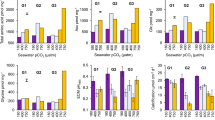Abstract
CALCITE produced by many marine organisms (including molluscs1, brachiopods2, coccolithophorids3, and planktonic foraminifera4,5) contains only about 5% as much magnesium as is predicted by laboratory studies of distribution coefficients6,7 (ratio of the Mg : Ca ratio in the solid against that in the solution). Understanding the cause of this low magnesium content is important to our comprehension of the calcification process. It is also of considerable interest to the field of low temperature geochemistry for several reasons. First, calcite is the major authigenic component of marine sediments, and its magnesium content is an important feature of its bulk composition. Second, the controls on the magnesium content of invertebrate skeleta must be understood if Mg : Ca ratios of calcitic fossils are to be used as indicators of sea salt palaeo-chemistry2 or sea surface palaeotemperature8. Third, the mechanism of magnesium inclusion may determine the role of magnesium in regulating selective dissolution of the tests from planktonic foraminifera4. Fourth, since calcite solubility depends on the magnesium content of the calcite, the mode of magnesium inclusion is a factor to be considered in calculating the degee of carbonate saturation in the oceans. Finally, factors governing the mode of magnesium incorporation into skeletal calcite are important to sedimentary petrologists using magnesium as a diagenetic indicator. We report here that the mussel Mytilus edulis, which normally secretes low magnesium calcite, incorporates anomalously high amounts of magnesium into its calcitic shell layer when it is grown in solutions of higher than normal magnesium content. Thus in normal conditions Mytilus physiologically excludes magnesium from its shell-forming fluid, and at higher magnesium concentrations ion regulatory systems breakdown, causing a substantial increase in the amount of magnesium coprecipitated into Mytilus shell calcite.
Similar content being viewed by others
References
Milliman, J. D. Marine Carbonates (Springer, New York, 1974).
Lowenstam, H. A. J. Geol. 69, 241–260 (1961).
Thompson, G. & Bowen, V. T. J. mar. Res. 27, 32–38 (1968).
Savin, S. & Douglass, R. G. Geol. Soc. Am. Bull. 84, 2327–2342 (1973).
Bender, M. L., Lorens, R. B. & Williams, D. F. Micropaleontology 21, 448–459 (1975).
Berner, R. A. Geochim. cosmochim. Acta 39, 489–504 (1975).
Katz, A. Geochim. cosmochim. Acta 37, 1563–1586 (1973).
Kilbourne, R. T. & Sen Gupta, B. K. S. East. Reg. G. S. A. abstr. Programs 408–409 (1973).
Lorens, R. B., Bender, M. L. & Williams, D. F., J. Sediment Pet. (in the press).
Moller, P. & Parekh, P. P. Mar. Chem. 3, 63–77 (1975).
Zolotarev, V. N. Geochem. Int. 11, 347–353 (1975).
Goldsmith, J. R. & Graf, D. L. Am. Mineral. 43, 84–101 (1958).
Pytkowicz, R. M. J. Geol. 73, 196–199 (1965).
Simkiss, K. Comp. Biochem. Physiol. 16, 427–435 (1965).
Author information
Authors and Affiliations
Rights and permissions
About this article
Cite this article
LORENS, R., BENDER, M. Physiological exclusion of magnesium from Mytilus edulis calcite. Nature 269, 793–794 (1977). https://doi.org/10.1038/269793a0
Received:
Accepted:
Issue Date:
DOI: https://doi.org/10.1038/269793a0
- Springer Nature Limited





